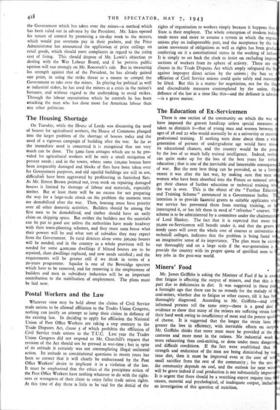The Housing Shortage
On Tuesday, while the House of Lords was discussing the need of houses for agricultural workers, the House of Commons plunged into the larger problem of the shortage of houses today and the need of a vigorous campaign of building after the war. So far as the immediate need is concerned it is recognised that not very much can be done. The 3,000 farm cottages which are to be pro- vided for agricultural workers will be only a small mitigation of present needs ; and in the towns, where some 12o,000 houses have been irreparably damaged and blocks of flats have been taken over for Government purposes, and old squalid buildings are still in use, difficulties have been aggravated by profiteering in furnished flats. As Mr. Ernest Brown pointed out, even work on repairing damaged houses is limited by shortage of labour and materials, especially timber. But at least there will be no excuse for not preparing the way for a large-scale attack on the problem the moment men are demobilised after the war. Then, housing must have priority over all other domestic activities. Builders should be among the first men to be demobilised, and timber should have an early claim on shipping space. But neither the builders nor the materials can be put to good use unless the authorities have made headway with their town-planning schemes, and they must soon know what their powers will be and what sort of subsidies they may expect from the Government. In rural districts alone some 300,000 houses will be needed, and in the country as a whole provision will be needed for some 4,000,000 dwellings if blitzed houses are to be repaired, slum dwellings replaced, and new needs satisfied ; and the requirements will be greater still if we think in terms of a 20-years programme. Squalor is one of the Beveridge spectres which have to be removed, and for removing it the employment of builders and men in subsidiary industries will be an important contribution to the stabilisation of employment. The plans must be laid now.


























 Previous page
Previous page